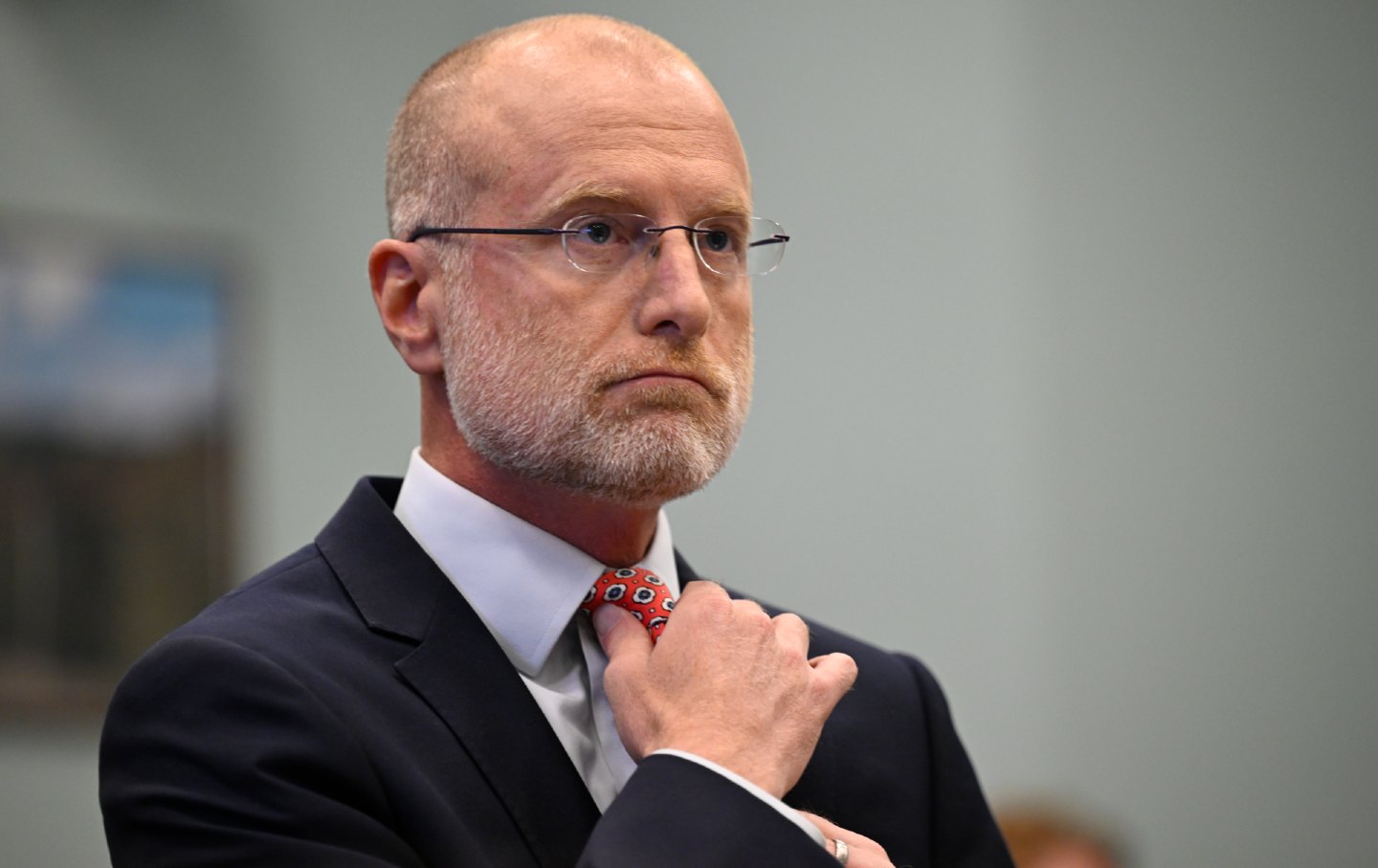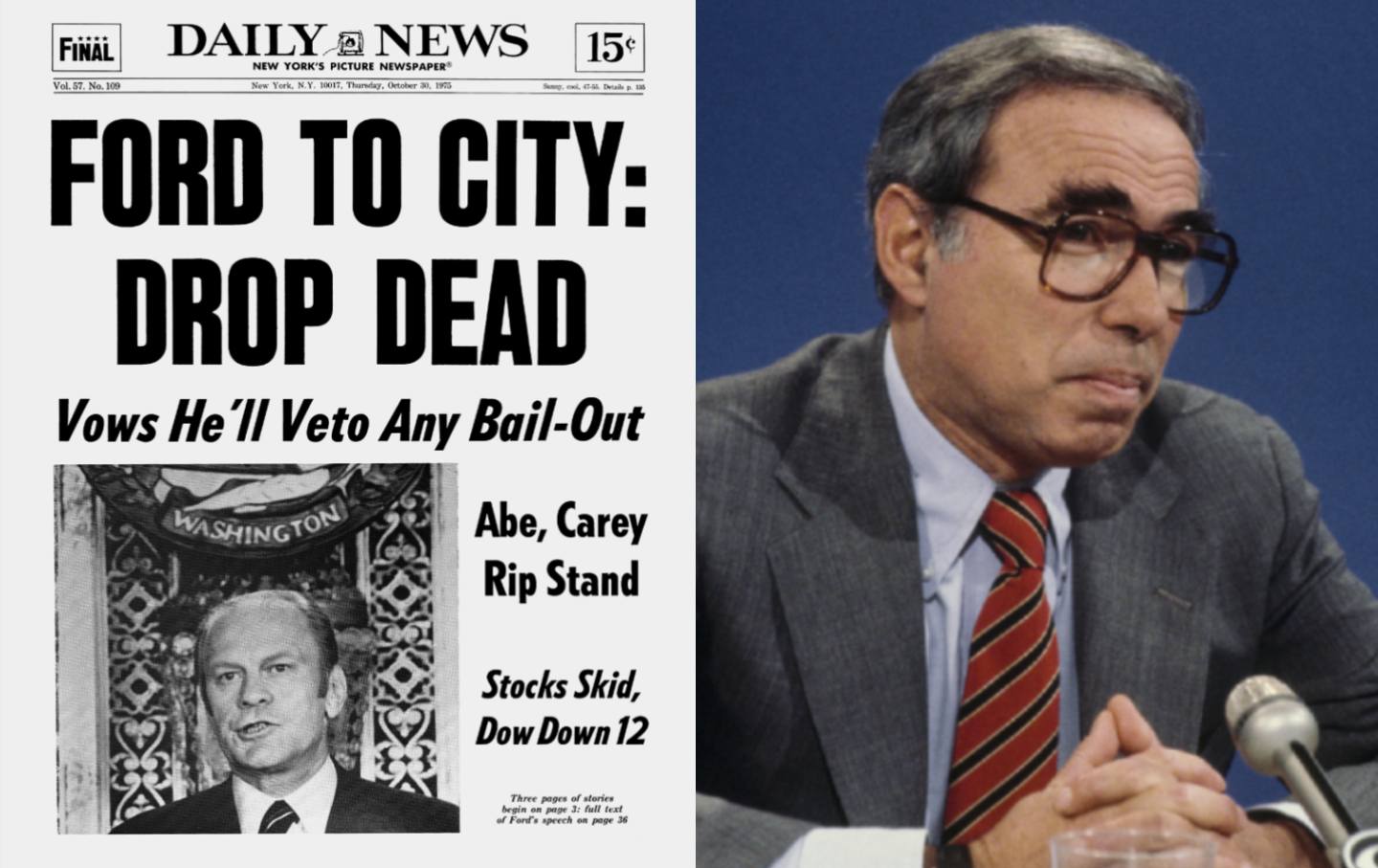June 25, 2025
With a new GOP majority, the incoming FCC boss aims to punish criticism, reward obedience—and screw the public.

When the Federal Communications Commission meets on Thursday in Washington, DC, the agency will have undergone a drastic transformation in just five months. Once a wonky telecom regulator that mostly avoided politics, the FCC is now at the leading edge of President Donald Trump’s crusade to turn the federal government into an instrument of his own will.
Since January, Trump’s FCC chief Brendan Carr has weaponized the agency to intimidate news organizations and media companies by threatening their broadcast licenses and launching sham investigations into their business practices and diversity programs. Carr is also racing to roll back FCC regulations, eliminate consumer protections, and unleash further media consolidation. Last week, the Senate confirmed former GOP congressional staffer Olivia Trusty to the agency, giving Carr the majority he needs to forge full-steam ahead with his MAGA agenda.
Free speech advocates call Carr’s actions a blatant violation of the First Amendment and federal law, and an egregious and unprecedented abuse of the agency’s power. A bipartisan group of former FCC commissioners recently accused Carr of turning the agency into the “White House’s personal censor.” In addition to cracking down on disfavored speech, the agency has already begun offering favors like merger approvals to media companies in exchange for their loyalty to the president.
“This is the most corrupt FCC in the agency’s history,” Victor Pickard, a professor of media policy at the University of Pennsylvania, told The Nation. “What we’re seeing now is outright Mafia-style behavior where the FCC is trying to shake down corporations and entire industries to carry out Trump’s agenda.”
Current Issue

In a baldfaced attempt to harass PBS and NPR, long despised by conservatives, Carr earlier this year launched an investigation into the fundraising practices of the public broadcasters, whose local affiliates provide reliable news, cultural programming, and critical information during emergencies. That investigation, which free speech advocates call a sham pretext to defund public media, formed the basis for Congress’s recent vote to rescind $1.1 billion in already-approved funding for the Corporation for Public Broadcasting, which supports NPR and PBS stations across the country.
Carr has also threatened Comcast, which owns MSNBC, with the loss of its broadcast licenses because Trump was offended by the network’s coverage of Kilmar Abrego Garcia, the Maryland man the administration admits was mistakenly sent to a prison in El Salvador. And he’s launched an investigation into CBS after Trump repeatedly called for the cancellation of the network’s broadcast licenses and demanded that the FCC impose “maximum fines and punishment” over a disputed 60 Minutes broadcast.
“The idea that we would revoke a broadcast license based on editorial decisions is antithetical to the First Amendment,” Anna M. Gomez, the FCC’s lone Democratic commissioner, told The Nation. “We need the FCC to honor the Constitution, to comply with the Communications Act prohibition against censorship, and to stand up to these types of attempts to weaponize the agency in order to retaliate against broadcasters.”
It’s quite a turnabout for Carr, who in 2021 declared that “a newsroom’s decision about what stories to cover and how to frame them should be beyond the reach of any government official, not targeted by them.”
For nearly a century, the FCC operated mostly outside the realm of politics, regulating the nation’s airwaves, licensing TV and radio stations, and promoting competition and diversity across the media landscape. Although FCC commissioners are nominated by the president, Congress designed the agency to act independently from White House influence, and for the most part, FCC chiefs treated that independence as essential to ensuring free speech and diversity over the nation’s airwaves.
Trump and Carr’s complete disregard for that principle is evident in their campaign of coercion against 60 Minutes, which has infuriated the president with its critical coverage of his hostility to Ukraine and imperial ambitions for Greenland. In an apparent attempt to bolster Trump’s bogus $20 billion lawsuit over last summer’s disputed Kamala Harris segment, Carr launched a “news distortion” investigation into CBS and has slow-walked approval of its parent company Paramount’s merger with Skydance Media. Paramount, in turn, has reportedly begun influencing 60 Minutes news coverage, leading to the resignation of two senior executives.
Carr, who has recently taken to wearing a gold Trump-head lapel pin, is also doing his part as a loyal MAGA minion by pressuring media giants like Comcast and Disney to join Trump’s anti-diversity crusade and abandon their DEI hiring policies. He’s threatened to block merger proposals from companies that fail to do so. In an abject display of corporate capitulation, Verizon dutifully obliged in order to win approval of its $20 billion buyout of Frontier Communications.
The Trump FCC’s assault on the First Amendment has been so shocking that it has diverted attention from Carr’s extreme pro-business, anti-consumer agenda. In April, Carr launched what he called a “massive deregulatory initiative” that public interest group Free Press described as “a brazen attempt to roll back consumer safeguards on a widespread scale for industry’s convenience.” The pro-consumer FCC policies on the chopping block amount to a big-business wish list that includes eliminating broadband label and truth-in-billing requirements, rolling back restrictions on scam robocalls and texts, and watering down digital discrimination rules that encourage equitable broadband deployment.
Popular
“swipe left below to view more authors”Swipe →
Earlier this month, Carr launched a proceeding aimed at eliminating FCC broadcast ownership caps that limit how many TV stations a single corporate entity can own. These rules, which are designed to foster diversity, competition, and local service across the national media landscape, have long been in the crosshairs of conglomerates like Nexstar, Sinclair and Gray Television, which together control 40 percent of all local news stations in the United States. Public interest groups warn that scrapping these rules would allow a handful of already-powerful corporate giants to further consolidate at a time when independent local news outlets are vanishing across the country.
Last week’s confirmation of Trusty violated a long-standing FCC practice in which the president simultaneously nominates candidates from both parties to fill vacancies at the agency. Given Trump’s illegal firing of two Democratic commissioners at the FTC, public interest advocates warn that Trump could fire Gomez, the remaining Democratic FCC commissioner, while elevating recently departed GOP commissioner Nathan Simington’s former chief of staff, 31-year-old MAGA ideologue Gavin Wax, who once declared that Trump’s reelection would be a “time for retribution.”
Wax would fit right in. If President Trump behaves like a Mafia boss, then Carr is acting like a MAGA enforcer, threatening Trump’s media enemies while doling out favors for corporate interests with little regard for the collateral damage done to the rule of law or the public interest. It’s a familiar Trump formula: weaponize the federal government to punish criticism, reward obedience—and screw the American public.
Every day, The Nation exposes the administration’s unchecked and reckless abuses of power through clear-eyed, uncompromising independent journalism—the kind of journalism that holds the powerful to account and helps build alternatives to the world we live in now.
We have just the right people to confront this moment. Speaking on Democracy Now!, Nation DC Bureau chief Chris Lehmann translated the complex terms of the budget bill into the plain truth, describing it as “the single largest upward redistribution of wealth effectuated by any piece of legislation in our history.” In the pages of the June print issue and on The Nation Podcast, Jacob Silverman dove deep into how crypto has captured American campaign finance, revealing that it was the top donor in the 2024 elections as an industry and won nearly every race it supported.
This is all in addition to The Nation’s exceptional coverage of matters of war and peace, the courts, reproductive justice, climate, immigration, healthcare, and much more.
Our 160-year history of sounding the alarm on presidential overreach and the persecution of dissent has prepared us for this moment. 2025 marks a new chapter in this history, and we need you to be part of it.
We’re aiming to raise $20,000 during our June Fundraising Campaign to fund our change-making reporting and analysis. Stand for bold, independent journalism and donate to support The Nation today.
Onward,
Katrina vanden Heuvel
Publisher, The Nation
More from The Nation

A new Hulu-produced series by the podcast superstar documents years of sexual harassment and institutional cover-up within Boston University’s athletics department.
Ray Epstein

Deporting people to countries where they might be tortured or killed? All good, according to the six GOP justices.
Elie Mystal

In Eugene, Oregon, CAHOOTS, a decades-old crisis-response program, may disappear, but the programs it inspired have spread across the United States, including to nearby Portland.
Kaia Sand

A new documentary about the 1975 fiscal crisis, Drop Dead City, is entertaining to watch but dangerously misleading as history—or politics.
Doug Henwood

A grant-supported program found success transitioning young people connected to gangs into higher education—until the money stopped coming.
Gail Cornwall

Former Cincinnati Reds player and manager Pete Rose represents a poisonous form of masculinity that should be rooted out, not beatified.
Robert Lipsyte


